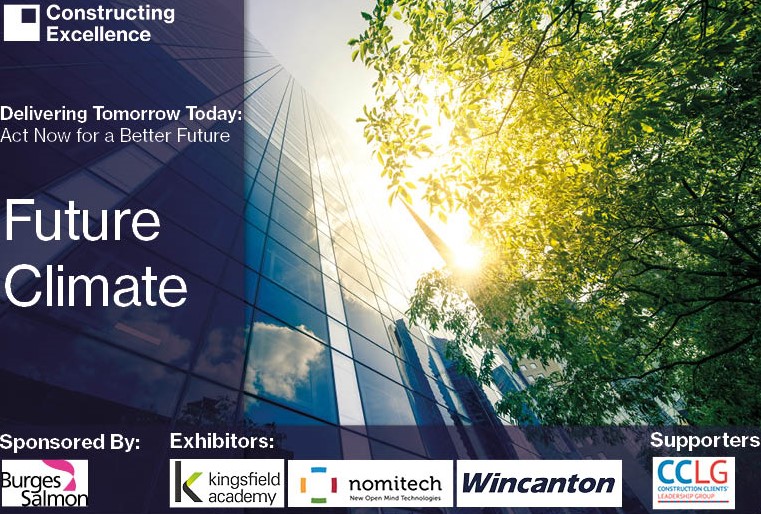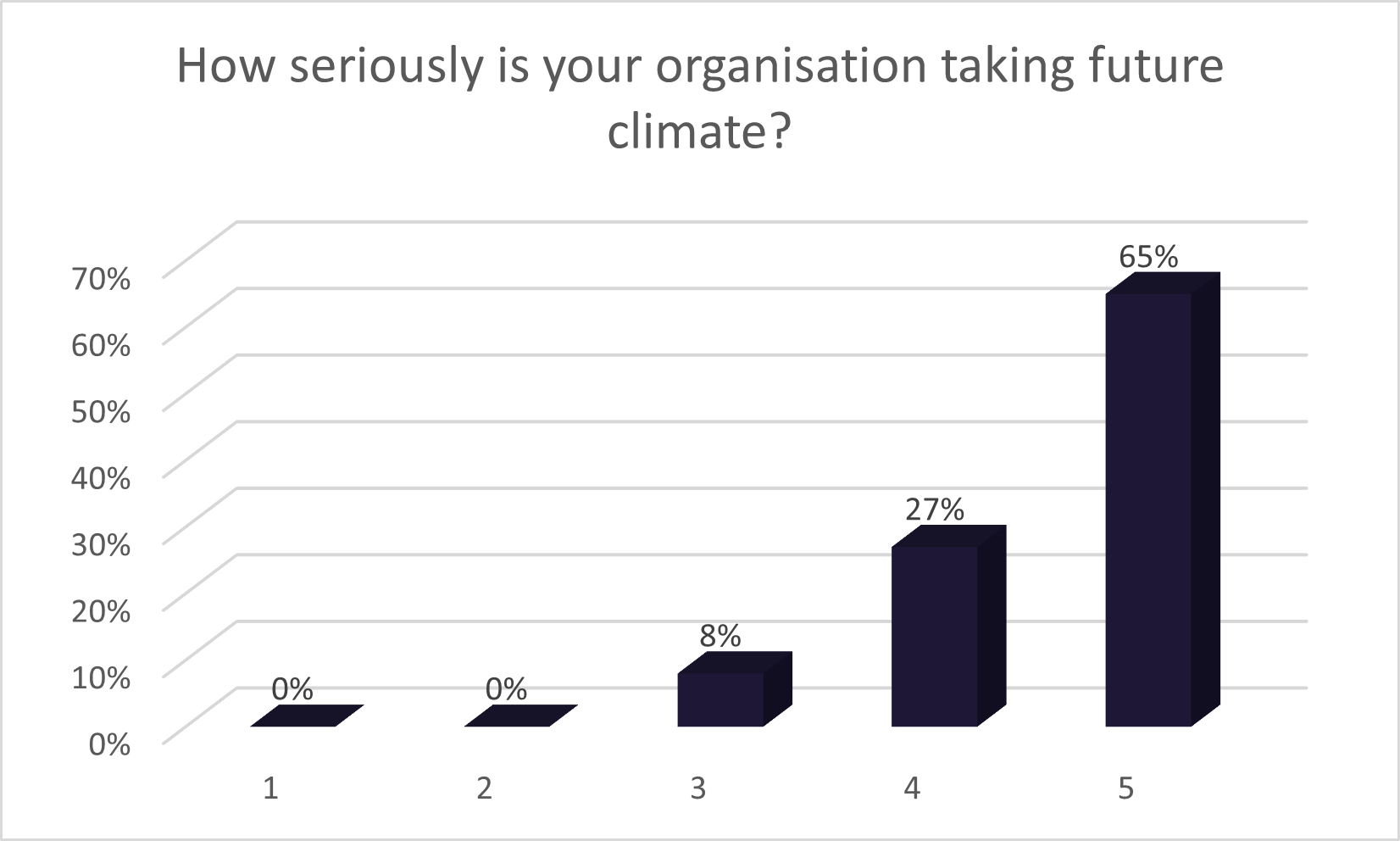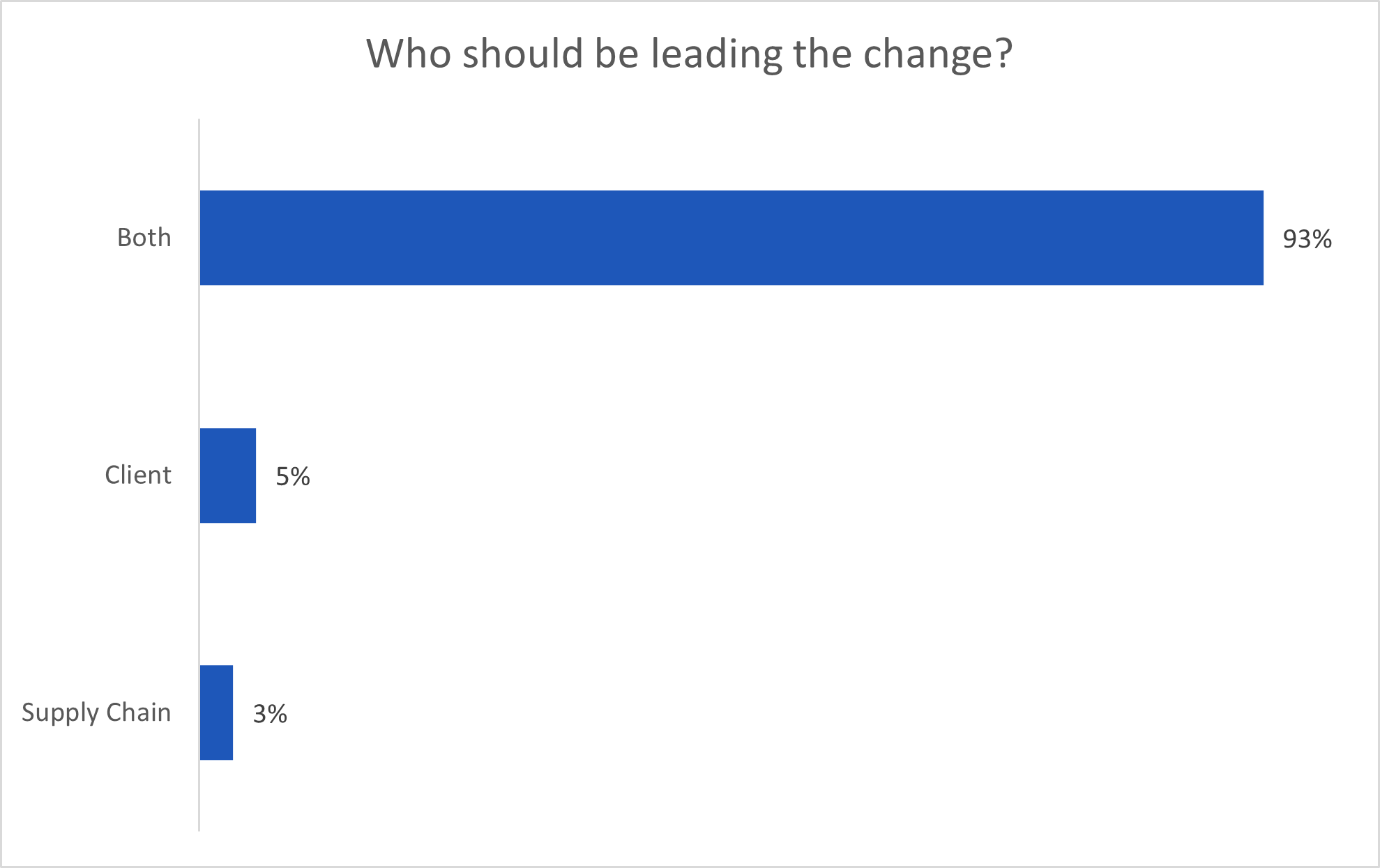On Wednesday 24th January, the Constructing Excellence Conference 2024, ‘Delivering Tomorrow Today’, took place. The first panel of the day focussed on Future Climate and explored the actions we can take now to enable a better future for the industry.
We were delighted to be joined by panellists from across the industry to share their insights. The session was Chaired by David Whysall and panellists included Dylan Stoppard, Sameer Pethe, Roxana Vornicu, Chris Clarke, Dr Ben Smith.

During the session, the audience were polled to establish their thoughts and opinions on the climate challenge. The results demonstrated that this is a serious consideration for everyone within construction.
Skills & Knowledge

Lack of skills and knowledge of future climate is one of the biggest challenges to future climate. No organisation acting alone has the necessary skills and knowledge, therefore an integrated approach to procurement and delivery is needed. The panel all agreed on the need for carbon literacy training. The entire value chain, including clients, advisors and supply chain, need to upskill their teams on future climate to create a wider pool of professionals with the skills and knowledge needed to continue to tackle the climate crisis.
Integrated Approach

An integrated approach enables more effective delivery. Taking a holistic, outcomes-focussed strategy can deliver better solutions. For example, delivering nature based solutions alongside new infrastructure rather than trying deliver stand alone projects. This kind of integrated approach reduces costs in the long run, improves shared knowledge and provides a better built environment overall.
The question is how do we bring together those in the know, connect those silos and work across boundaries? Construction contracts are key- there are numerous standard contract forms that enable integration and could be used to better manage and implement an integrated approach. Constructing the Gold Standard advocates for, “multi-party relationships that align objectives, success measures, targets and incentives with commitments to joint work on improving value and reducing risk”.
Collaboration

Collaboration is crucial to delivering a more sustainable, less wasteful future for the industry. It can inform better procurement practices, as early conversations enable decisions to be made before any money is spent, and can facilitate early supply chain involvement. Ultimately, if we don’t procure in the right way, it will end up costing more.
Contractual mechanisms must be implemented to provide structure to collaborative working arrangements and benefits to the whole supply chain. By engaging and collaborating with the entire supply chain, customer requirements for more sustainable products can be fed back to manufacturers who can develop and upscale production of lower carbon products.
Cross-industry collaboration, e.g. through Constructing Excellence, is an importance mechanism for learning and applying new net zero, low carbon technologies and techniques. This sharing encompasses best practice, data, lessons learned and skills.
Inefficiency

The industry needs to become more efficient in its use of resources. Sustainable products and methods are often perceived to be more expensive, however, there is capacity and waste in the system already that could be repurposed. We don’t need to spend more money to be more sustainable, we need to look at where we’re already spending our money and decide whether this is the most effective use.
An easy sustainable win for construction is reducing the waste materials it produces. Building with less and having a lean attitude when designing and building will hugely impact the amount of industry waste. This will also help us to reduce the use of less sustainable materials, such as concrete and steel. Research is being undertaken to find alternatives but, in the meantime, we have a responsibility to be more mindful about the materials we are using. Using less material now is a great way to make a difference for the future.
Resilience

Planning and design have the one of the biggest impacts on the climate challenge. We need to start planning buildings and retrofit that will support a better future and we need to do this NOW!
Climate change will bring with it many side effects on nature and the environment, which will in turn have a big impact on the built environment. However, if you follow the No Natural Disasters way of thinking, there are no natural ‘disasters’, there are merely natural events that interact with society- the disasters are caused by how people deal with these events. Therefore, as an industry, we need to consider the people we are building for when planning future projects to develop greater resilience and ensure society is ready to deal with any natural events we may face.
We should to consider the needs that different buildings will be required to meet in the changing climate, for example we are faced with rising temperatures and will need to find a way to keep homes cool. If we consider this now, in line with the current focus on keeping homes warm, we will be able to tackle both problems at the same time and find more efficient and cost-effective solutions for the long run.
Resilience is a big opportunity for the sector and is something we need to move on immediately. Where we have started to see improvements in understanding and skills around carbon reduction, we’re not yet seeing the same uptake on resilience.
Leadership

Leadership on the climate challenge needs to come from a multiple directions. It is not solely government who should be working towards a better future climate, but it is incumbent on organisational leaders, clients and all of us within the industry.
There’s no special key to deliver results but there are solutions. They are holistic, circular and complex but they start with client strategy. Legislation is useful as it comforts public officials, but it won’t change an industry by itself, clients need to accelerate this. Industry professionals need to work with clients to help them ask for the right things, explaining the need for Net Zero and demonstrate that it doesn’t have to cost more.
Organisations need to link sustainability and future climate to their remuneration packages and business plans. They need to publish their goals and report on progress, this opens up a plethora of opportunities to work-winning and staff recruitment and retention through access to finance and investment.
It’s Our Collective Responsibility…
Whilst organisations need to act, we all have a responsibility for our personal response to the climate challenge. There are many steps and actions that have been identified in the Future Climate panel that can be taken on an individual basis, especially considering many of them don’t actually have to cost more.
Ultimately, we have to start somewhere, waiting for the perfect fix doesn’t benefit anyone,
“Let’s avoid the perfect as the enemy of improvement”
Chris Clarke.
Thanks to Our Sponsors





